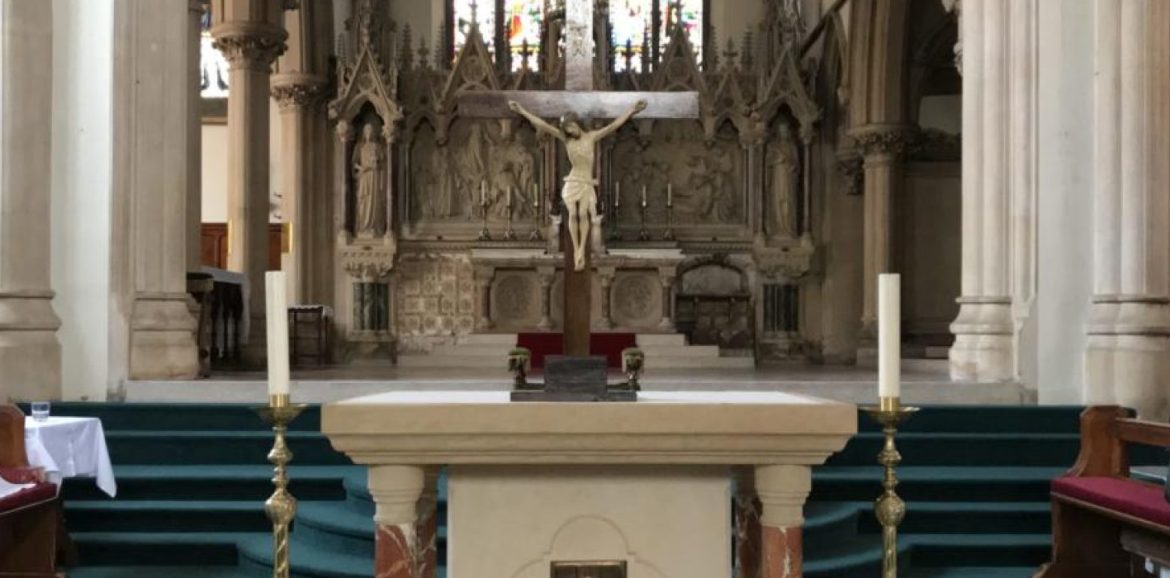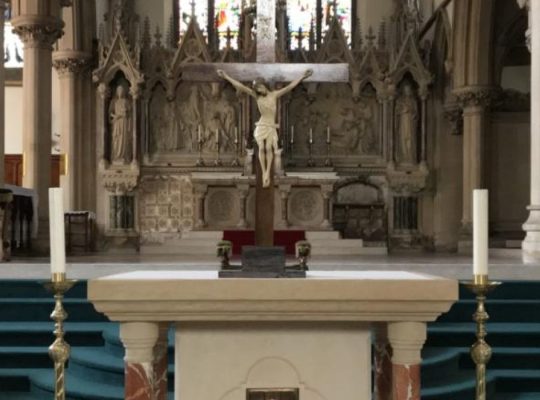As we enter Ordinary Time of Year B, we shall predominantly hear from Mark’s Gospel. However, every year on this Second Sunday all three synoptic Gospels are introduced by a passage from John. This year, John reminds us of the manner in which two of the disciples of John the Baptist are led to recognise ‘the Lamb of God,’ shown to them by the Precursor. This text is especially appropriate for more than one reason, as we shall see. For Mark, ‘Jesus Christ [the Son of God]’ is the good news. Therefore, he only briefly mentions John the Baptist’s preaching, Jesus’ baptism in the Jordan, and his temptation in the desert. Indeed, everything begins with these events. But Mark cannot wait to come to Jesus’ personal manifestation, when he starts to preach in Galilee and calls his first four disciples; (this passage we shall hear in next week’s Gospel.) Mark explicitly notes that the beginning of Jesus’ ministry coincides with the Precursor’s arrest. The first sequence is therefore harmoniously constituted by two Gospels that fit perfectly together.
The First Reading is chosen in relation to the Gospel. The account of Samuel’s vocation reminds us of the way in which Eli the priest leads his young disciple to enter the service of the God who calls him. In like manner, John the Baptist prompts Andrew and John to follow the new master whose way he has prepared.
Our First Reading tells a beautiful, simple, and moving story recorded in the First Book of Samuel. A young child, dedicated to the service of the sanctuary, is awakened three times by a call. Naturally, he thinks that Eli the priest who is in charge of the sanctuary, called him. Immediately, the child rises: ‘Here I am. You called me.’ No, ‘I did not call you,’ the priest answers twice. The child must have had a dream in which he heard a voice; this commonly happens. The third time, Eli understands; it was not an ordinary dream, but one of those in which God speaks: ‘Go to sleep, and if you are called, reply, Speak Lord, for your servant is listening.’ Samuel does as he is told. The Lord—for it was the Lord—’came and revealed his presence, calling out as before, ‘Samuel, Samuel!’’ And Samuel answers, ‘Speak, Lord, for your servant is listening.’ He grows up and becomes one of the most important persons in the Old Testament.
Turning to our Gospel; the Four evangelists attest that Jesus’ ministry began quite simply after John the Baptist prepared the way by his preaching. However, the Fourth Gospel insists more than the others on the testimony given to Jesus by a deliberately self-effacing John. Furthermore, the Fourth Gospel is the only one to note that Jesus’ first disciples belonged to the entourage of the Baptist, who himself urged them to follow the one he had shown them.
As is often the case with John’s Gospel, the scene is sparingly drawn: a brief exchange of words, not the slightest indication of the protagonists’ feelings. The facts are precisely stated, but their meaning is what holds the attention. We have here, a decisive event for those who, first, are directly concerned. ‘It was about four in the afternoon.’ We remember the day and the hour of an encounter that has turned our lives upside-down . Such a precise description is like the signature of the persons recording facts in which they themselves are involved. However, it is not for personal reasons that John places this narrative at the beginning of his Gospel. The first public appearance of Jesus—for the baptism is not mentioned—contains an important doctrinal and spiritual teaching about the Lord’s person and on the faith of his followers.
‘In Bethany across the Jordan where John was baptising,’ he has received a delegation of priests and Levites from Jerusalem, come to question him. ‘I am not the Messiah,’ John openly declares. ‘I baptise you with water, but there is one among you whom you do not recognise, the one who is coming after me, whose sandal strap I am not worthy to untie.’
‘The next day John was there again with two of his disciples, and as he watched Jesus walk by, he said ‘Behold the Lamb of God.’’ In the Book of Revelation, this appellation, familiar to Christians, is the proper name of Christ dead and risen, exalted at God’s right hand. It has its source in the Christian understanding of prophetic oracles and of the paschal sacrifice that announced the Lord’s pasch. Whatever the origin of this title, John intends for us to look at it with eyes enlightened by paschal faith, from the moment of Jesus’ first public appearance. We must keep this in mind as we begin to read Mark’s Gospel, which ends with the narrative of the discovery of the empty tomb by Mary Magdalene and Mary the mother of James and Salome.
The readers are thus confronted with the decision to believe or not to believe, a decision to which the whole of Mark’s Gospel leads them by progressively unveiling the mystery of Jesus, who is, John the Baptist says, from the beginning, ‘The Lamb of God.’ Through the voice of the Baptist, who is the last of the prophets, it is the Old Testament that designates Jesus as the victim of the new Pasch. ‘John testified to him, and cried out, ‘this is he of whom I said, ‘the one who is coming after me ranks ahead of me because he existed before me.’’ He behaves as an authentic ‘friend of the bridegroom’: ‘He stands and listens for him, rejoices greatly at the bridegrooms voice. So this joy of mine has been made complete. ‘He must increase: I must decrease.’ John is not content with simply testifying to Jesus; he effaces himself before him, after showing him to two of his disciples in order that they might detach themselves from him and go to the Lamb of God.
‘Jesus turned and saw them following him and said to them, ‘what are you looking for?’’ He does not seek information; he gives a call; he arouses desire. ‘Where are you?’ God says to Adam who is hiding from him. ‘All of human history as described in the Bible may be summarised in one phrase: God in search for man. Faith in God is a response to God’s question…….The way to God is a way of God. Unless God asks the question, all our enquiries are in vain.’ (Heschel)
‘Morning after morning he opens my ear that may hear.’ (Isa 50:4) ‘The soul seeks the Word but it does so because the Word has been seeking the soul’ (St. Bernard)
‘What are you looking for?’ The two disciples of John the Baptist have correctly understood this question. ‘Rabbi [Teacher] where are you staying?’ ‘Where is your school?’ ‘Where can we learn to know you?’ In the same way as they had become attached to John the Baptist, the two disciples speak their desire to follow the Lamb of God from now on.
‘Come, and you will see.’ Jesus’ reply means that he ready to accept these two men’s request. But they must, in total freedom, ratify it, so to speak, by concrete action, by accompanying Jesus wherever he goes. ‘So they went and seen where he was staying, and they stayed with him that day.’
‘To see.’ To stay’— Later the apostles will attest to what they have ‘seen,’ ‘heard,’ and even ‘touched’ of God’s Word so that we may all believe in our turn. Nothing is said of the conversation of this first meeting, of Jesus’ first teaching, but the two disciples stay and they see, and they listen and in doing so, decide to stay further with him, resulting in this initial meeting with the Lord to the resolute commitment to follow him in order to be near him and live in intimate association with him.
Andrew and the other disciple join Jesus, who is walking by along the Jordan, because they have heard the Baptists testimony. After spending just one day at there Masters house, Andrew. Shares their discovery with his brother Simon: ‘We have found the Messiah. He takes Simon to meet Jesus.’ Jesus looked at him and said, ‘You are Simon, the son of John; you will be called Cephas [Peter — the rock].’ We will later discover that it will be on this rock that Jesus will build his Church.
And so it is thus with every call. It is the Lord who first marks us out, he who invites us and chooses us.It is he who takes the initiative of calling us and making himself known to us. The first call is not always clear, as is shown by the story of Samuel’s vocation and of many others after him. Even today, we find calls going unanswered. But all is not lost, the Lord is patient, the call gains clarity when it finds a listening heart, thanks particularly to the meditation, testimony and example of those who have already met and recognised the Lord. They help us to advance, to progress toward him who is at the core of faith and to follow him. Every believer has a responsibility toward others. Faith is not a treasure to be jealously guarded for ourselves; on the contrary, it grows in the measure in which it is shared, the measure in which we say with thanksgiving, not only by our words but by our lives.
‘Come and see. Jesus is Lord.’


